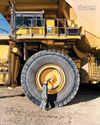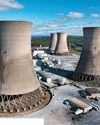
THE PROTESTS STARTED in the chill of winter and got bigger as the weather got warmer. At one gathering place outside rural Clearbrook, Minn., the demonstrators often outnumbered the town's 500 or so residents, as activists, farmers, and citizens of nearby Native American reservations turned out to resist a catastrophe in the making.
The protesters were there to stop the building of Enbridge Energy Line 3, a 1,000-mile-plus oil pipeline that would connect the Alberta tar sands in Canada to refineries in the U.S. Its foes believed the pipeline, if breached, could foul rivers and aquifers that they counted on for their livelihoods; more broadly, the flow of hydrocarbons it enabled would aggravate the global climate crisis.
The protests were mostly peaceful, but as the crowds grew, authorities made it clear that the law was on the pipeline's side. On one tense day in June 2021, a Customs and Border Protection helicopter suddenly swooped in low, at about 20 feet above the crowd. The pilot positioned the aircraft to hover directly over a gravel road, and its tail rotor whipped up a tornado of dust and rocks, blasting dozens of protesters. Police later swept in and made more than 100 arrests.
The show of force didn't stop the protests but the protests didn't stop the pipeline. Line 3 opened in October 2021, and since then it has pumped 760,000 barrels a day of heavy crude oil into the United States. Over the next 30 years, oil transported via Line 3 is projected to result in 5.8 billion metric tons of carbon dioxide being released into the atmosphere, equal to the emissions of 50 coal-burning power plants. That figure doesn't account for the incalculable impact of the destruction of 2 million acres of carbon-absorbing forest in Albertadenuded to access the oil in the ground-or the energy-intensive process of extracting oil from tar sands.
This story is from the {{IssueName}} edition of {{MagazineName}}.
Start your 7-day Magzter GOLD free trial to access thousands of curated premium stories, and 9,000+ magazines and newspapers.
Already a subscriber ? Sign In
This story is from the {{IssueName}} edition of {{MagazineName}}.
Start your 7-day Magzter GOLD free trial to access thousands of curated premium stories, and 9,000+ magazines and newspapers.
Already a subscriber? Sign In

THE NEW GOLD RUSH
Gold prices have soared amid global uncertainty and a central-bank-driven buying spree. But this time, the gold mining industry looks very different.

A New Season for Giving
As the PGA TOUR kicks off its 2025 season alongside its sponsors in Hawai'i, the organization is continuing to make an impact in local communities.

WELCOME TO ELONTOWN, USA
The small town of Bastrop, Texas (pop. 12,000), has become a home base for Elon Musk's business empire. What comes next is anyone's guess.

100 MOST POWERFUL PEOPLE
Our inaugural, authoritative ranking of the leaders whose innovation and impact have elevated them to the top of the business world.

ARE CEO SABBATICALS THE ULTIMATE POWER MOVE?
WHEN VENTURE capitalist Jeremy Liew and his wife were dating, they talked about how one day they would take a year to travel the world. \"That's how we'd know we'd made it,\" Liew says.

WHAT ARE THE BEST METRICS FOR MEASURING A STARTUP'S POTENTIAL?
IN HIS 2012 ESSAY \"Startup = Growth,\" Paul Graham talks about a 5% to 7% weekly growth rate as table stakes for startup success. If you're growing 10%, he says, you're doing \"exceptionally well.\"

TECH POLYMARKET'S ELECTION ACCURACY MADE SHAYNE COPLAN A STAR-BUT AN FBI RAID POINTS TO TROUBLE AHEAD
IN NOVEMBER, Shayne Coplan had a week he'll remember for the rest of his life: He got a phone call from the highest echelons at Mar-a-Lago. He went on TV for the first time. And his New York City apartment was raided by the FBI.

WHY BIG TECH IS THE NUCLEAR INDUSTRY'S NEW BEST FRIEND
OVER THE PAST several years, Big Tech firms like Google and Microsoft have trumpeted ambitious plans to go carbon-neutral, or even carbon-negative, by 2030. But then the generative-AI boom came along and threw a giant wrench in their plans.

WHAT PALMER LUCKEY, THE MAN REVOLUTIONIZING WARFARE, IS AFRAID OF
PALMER LUCKEY, the founder of the $14 billion Al-powered weapons startup Anduril, has become the face of change in the defense industry.

GLOBAL BUSINESS BRACES FOR TRUMP 2.0
AROUND THE WORLD in 2024, voters chose change: in South Africa, France, Britain, and Japan. But nowhere does the anti-incumbent trend matter more than in the United States.